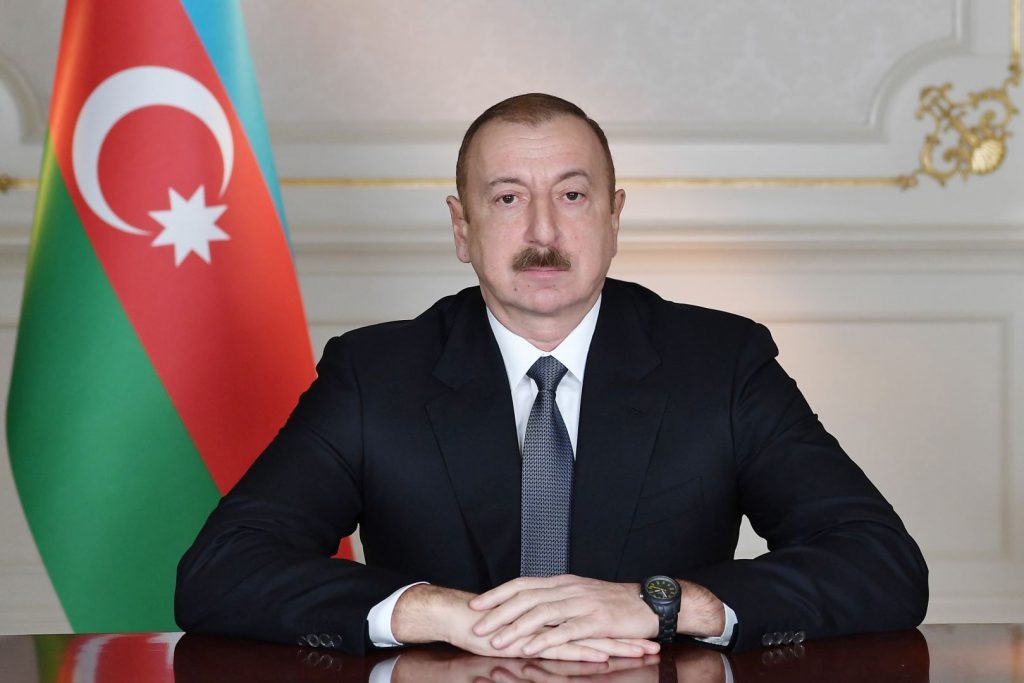Ilham Aliyev, born on December 24, 1961, in Baku, Azerbaijan, is the fourth President of Azerbaijan, having held office since October 2003. He succeeded his father, Heydar Aliyev, who had been a prominent political figure in Soviet Azerbaijan and the independent Republic of Azerbaijan. Ilham Aliyev’s presidency was remembered for the rich energy resources of the country, as well as the solution to the Karabakh issue.
Early Life and Education
Ilham Aliyev was born into a politically influential family. His father, Heydar Aliyev, was a high-ranking official in the Soviet Union, serving as the First Secretary of the Communist Party of Azerbaijan and later as a member of the Soviet Union’s Politburo. His mother, Zarifa Aliyeva, was a renowned ophthalmologist.
Ilham Aliyev grew up in Baku and received his early education in the capital. In 1977, he entered the prestigious Moscow State Institute of International Relations (MGIMO), where he earned both his undergraduate and doctoral degrees. During his time at MGIMO, Aliyev studied international relations, economics, and politics, preparing himself for a career in diplomacy and governance.
Career Before the Presidency
After completing his studies, Aliyev worked at MGIMO as a professor, teaching political science and international relations. However, with the dissolution of the Soviet Union and Azerbaijan’s declaration of independence in 1991, Aliyev’s career path shifted toward politics and business.
During the 1990s, Ilham Aliyev became increasingly involved in his father’s political activities. Heydar Aliyev had become the leader of independent Azerbaijan in 1993, taking over after a period of political instability and conflict in the country. Under Heydar Aliyev’s leadership, Azerbaijan began to stabilize, and he implemented policies aimed at modernizing the country’s economy, particularly through the development of its oil and gas industry.
Role in the Oil Industry
Ilham Aliyev played a significant role in shaping Azerbaijan’s energy sector, which is central to the country’s economy. In the mid-1990s, he became involved in the State Oil Company of Azerbaijan Republic (SOCAR), eventually rising to the position of vice president. His work at SOCAR allowed him to gain valuable experience in the energy sector, and he was instrumental in negotiating key contracts with multinational oil companies. These deals helped establish Azerbaijan as a major player in the global energy market.
Ilham Aliyev’s involvement in the oil industry also bolstered his reputation as a capable leader in economic matters, which would later support his rise to the presidency.
Ascension to the Presidency
In August 2003, Ilham Aliyev was appointed as the Prime Minister of Azerbaijan, positioning him as his father’s likely successor. At the time, Heydar Aliyev was in declining health, and the transfer of power appeared imminent.Just a few months later, in October 2003, Ilham Aliyev nominated for the presidency.
Ilham Aliyev won the elections with 76 percent of votes and became the fourth president of Azerbaijan on October 31, 2003. His father, Heydar Aliyev, died in December 2003, shortly after his son took office.
Economic Growth and Energy Policy
Ilham Aliyev’s presidency has been characterized by rapid economic growth, largely driven by Azerbaijan’s vast oil and gas reserves. The country’s economy expanded significantly in the 2000s, thanks to lucrative contracts with international energy companies and the construction of major pipelines like the Baku-Tbilisi-Ceyhan (BTC) pipeline, which transports Azerbaijani oil to global markets.
Under Aliyev’s leadership, Azerbaijan became one of the fastest-growing economies in the world, with significant infrastructure development and improvements in the standard of living for many citizens. The revenues from the energy sector allowed the government to invest in roads, schools, hospitals, and housing, contributing to a modernized and more urbanized Azerbaijan.
However, Azerbaijan’s heavy dependence on oil and gas revenues has also led to concerns about the sustainability of its economy. Fluctuations in global oil prices have created economic instability at times, and the country faces challenges in diversifying its economy beyond the energy sector.
Nagorno-Karabakh Conflict
A significant aspect of Ilham Aliyev’s presidency has been his handling of the ongoing conflict with Armenia over the Nagorno-Karabakh region. The Nagorno-Karabakh conflict began in the late 1980s during the final years of the Soviet Union and has remained a source of tension between Azerbaijan and Armenia.
The 2020 Nagorno-Karabakh War
In September 2020, a full-scale war broke out between Azerbaijan and Armenia over the disputed region. The conflict lasted for six weeks and resulted in a decisive Azerbaijani victory, with significant territorial gains. A Russia-brokered ceasefire ended the fighting in November 2020, with Azerbaijan reclaiming territories that had been under Armenian control since the early 1990s.
Ilham Aliyev hailed the victory as a restoration of Azerbaijan’s territorial integrity and a major national achievement. The war significantly bolstered his domestic popularity, and many Azerbaijanis viewed the outcome as a vindication of Aliyev’s long-standing efforts to strengthen the country’s military.
However, the conflict also resulted in heavy casualties on both sides and deepened the humanitarian crisis in the region. While the ceasefire ended active hostilities, the underlying tensions between Armenia and Azerbaijan remain unresolved, and the future of Nagorno-Karabakh is still a subject of international concern.
Foreign Policy
Ilham Aliyev has pursued a pragmatic and balanced foreign policy, maintaining strong relations with both Western countries and regional powers like Russia and Turkey. Azerbaijan’s strategic location between Europe and Asia, along with its vast energy resources, has made it a key player in regional geopolitics.
Relations with Turkey
Turkey has been one of Azerbaijan’s closest allies under Ilham Aliyev’s leadership. The two countries share strong cultural, historical, and linguistic ties, and their relationship has been further strengthened by military and economic cooperation. Turkey was a staunch supporter of Azerbaijan during the 2020 Nagorno-Karabakh war, providing diplomatic and military backing.
Relations with Russia
Despite historical ties with Russia, Aliyev has sought to maintain Azerbaijan’s independence in foreign policy decisions, balancing relationships with Russia and Western countries. Russia remains an important partner for Azerbaijan, especially in terms of regional security and energy cooperation, but Aliyev has also been cautious to avoid becoming too reliant on Moscow’s influence.
Personal Life
Ilham Aliyev is married to Mehriban Aliyeva, who serves as the First Vice President of Azerbaijan. Mehriban Aliyeva is also an influential political figure in her own right, known for her philanthropic work and her involvement in cultural projects. The couple has three children: Leyla, Arzu, and Heydar Aliyev Jr.
Ilham Aliyev is fluent in multiple languages, including Azerbaijani, Russian, English, and French. His public image is carefully managed, and he is often portrayed in state media as a strong and decisive leader who has guided Azerbaijan through a period of rapid modernization and economic growth.
Conclusion
Aliyev’s role in the 2020 Nagorno-Karabakh war significantly boosted his standing both domestically and internationally, positioning him as a key figure in the region’s geopolitics.
created by ChatGPT | All right reserved



